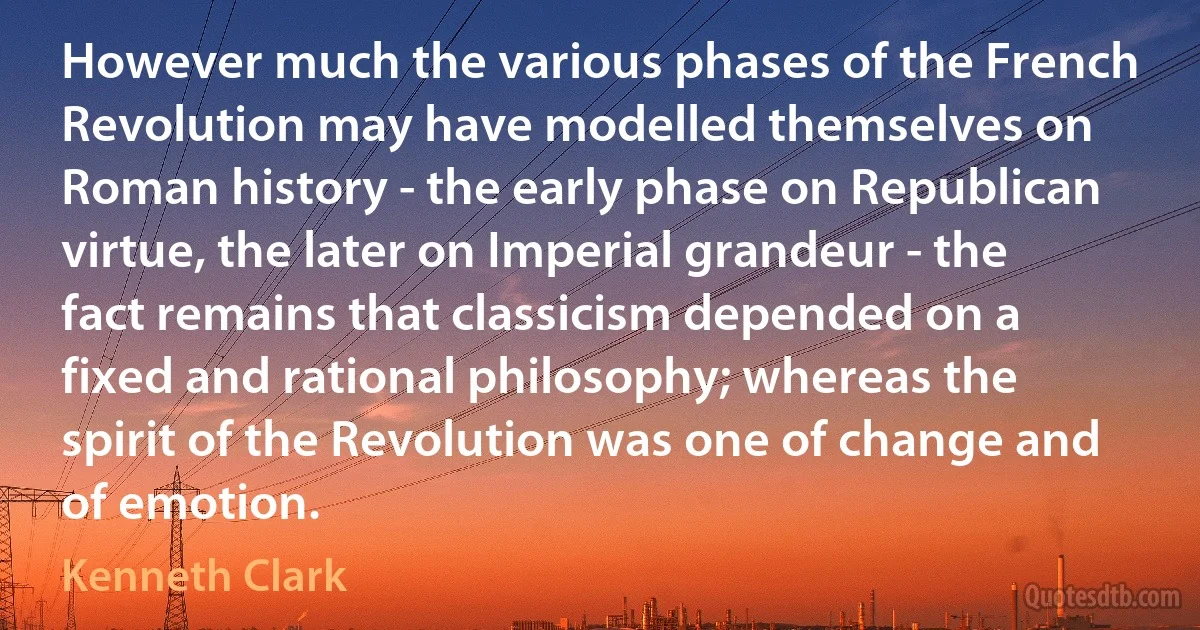Classicism Quotes
White
This is the spiritual colour of our times, the clearness which directs all our actions. It is neither grey nor ivory white, but pure white.
White This is the colour of modern times, the colour which dissipates a whole era; our era is one of perfection, purity and certitude.
White It includes everything. We have superseded both the 'brown' of decadence and classicism and the 'blue' of divisionism, the cult of the blue sky, the gods with green beards and the spectrum.
White pure white...

Theo van Doesburg
It was no accident that I found my way to Götz at the time [c. 1960-62]. This 'Informal' element runs through every picture I've painted, whether it's a landscape, or a family painted from a photograph, or the Colour Charts or a Grey picture. And so now it is a pursuit of the same objectives by other means.. .As I now see it, all my paintings are 'Informal'.. ..except for the landscapes, perhaps.. .The 'Informal' is the opposite of the constructional quality of classicism – the age of kings, of clearly formed hierarchies.

Gerhard Richter
I'd like to combine melancholy and sunshine... There's a sadness in Provence which no one has expressed; Poussin would have shown it in terms of some tomb, underneath the poplars of the Alyscamps... I'd like to put reason in the grass and tears in the sky, like Poussin... You really need to see and feel your subject very clearly, and then If I express myself with distinction and power, there's my Poussin, there's my classicism..

Paul Cézanne
The eighteenth century is full of contradictions. It is not only that its philosophical attitude wavers between rationalism and anti-rationalism, but its artistic aims are also dominated by two 122 opposite tendencies and at some times approach a strictly classicistic, at others a more unrestrained pictorial conception. And like the rationalism of the period, its classicism is also difficult to define and open to various sociological interpretations, since it is sustained alternately by courtly-aristocratic and middle-class strata of society and ends by developing into the representative artistic style of the revolutionary bourgeoisie.

Arnold Hauser
Totalitarian art must be a form of classicism: the state which is founded on order and subordination demands an art with a similar basis. Romantic painting, however popular, expresses the revolt of the individual. The State also requires an art of reason by which appropriate works may be produced as required. Inspiration is outside state control. The classic attitude toward subject matter - that it should be clear and unequivocal - supports the attitude of unquestioning belief. Add the fact that totalitarian art must be real enough to please the ignorant, ideal enough to commemorate a national hero, and well enough designed to present a memorable image, and one sees how perfectly The Death of Marat fills the bill. That it happens also to be a great work of art makes it dangerously misleading.

Kenneth Clark
The all-inclusiveness of the equilibrium concept in New Classicism warns against comparisons of EBCT and ABCT that ignore the radically different methodological contexts. For instance, the inevitable bust that figures importantly in ABCT cannot easily be translated into the language of EBCT. For the Austrians, "equilibrium bust" is a term at war with itself; for the New Classicists, "disequilibrium bust" can only mean an unexplainable downturn.

Roger Garrison
To approach Chopin, you have to separate him completely from Schumann. Schumann admired Chopin very much and saw him as friend, but - what only few people know - Chopin himself had much less interest in and esteem for Schumann. In detail: Schumann's works follow on from a transitional period determined by the successors of Viennese Classicism, particularly Beethoven. Just as the sons of Bach espoused the ‘galant,' ornamented style of their generation, so the pupils of Mozart and Beethoven - Hummel, Ries, Czerny, Moscheles - took pains to compensate for a thinner musical substance with increased instrumental brilliance and thus prepared the ground for the golden age of the piano and the era of the Romantic virtuoso. Among the multitude of composers writing for the piano at that time, only two - Weber and Schubert - stand out as original creative forces.

Burkard Schliessmann


